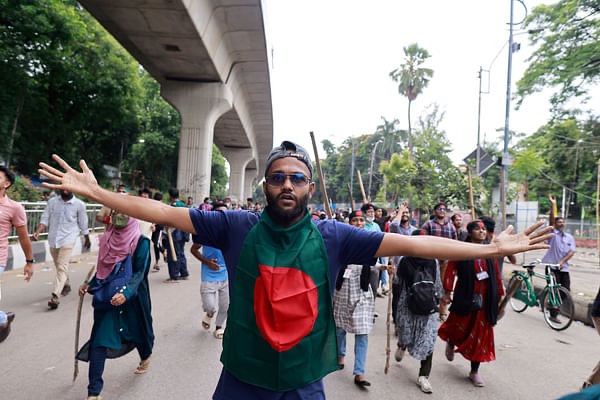By Thomas Kin
Her escape to India was unsurprising after a large mob marched towards Ganabhaban, as the underlying issues within Bangladesh’s government had been apparent for years. While Bangladesh’s “economic miracle” significantly reduced poverty, the praise for this achievement eventually began to falter. Following Hasina’s ousting, an interim government was rapidly formed under the leadership of Nobel laureate Muhammad Yunus, facilitated by discussions between the army chief, the president, and student leaders. Yunus, respected for his impartiality and integrity, had previously been targeted by personal vendettas.
There was growing frustration over Hasina’s manipulation of national elections, restriction of personal freedoms, and erosion of institutions. The corruption and mismanagement by patronage networks supporting increasingly unpopular leaders had devastated the economy. Hasina’s Awami League won a landslide victory in a one-sided vote after the opposition BNP boycotted the January 2024 election. However, the Awami government could not conceal the public discontent that arose following this uncontested election.
Inside Bangladesh, there is a mix of uncertainty about the political future and hope for the revival of democracy. Many hope Yunus will lead political reforms to restore democratic governance, stabilize the economy, and prevent the emergence of another autocratic leader—a formidable challenge for the new government.
Alongside addressing domestic issues, Yunus must focus on foreign policy. Bangladesh now needs to engage diplomatically with its neighbor India, which was kept in the dark about the recent developments in Bangladesh. Hasina had been backed exclusively by New Delhi for the past 15 years and took refuge in Delhi after being deposed. India’s strong support for an unpopular leader has embarrassed the country and exacerbated anti-India sentiments in Bangladesh, damaging India’s geopolitical standing.
Therefore, India must navigate this situation carefully, avoiding any actions that could undermine the interim government or the aspirations of the Bangladeshi people. Some Indian commentators have blamed foreign intervention for Hasina’s downfall, with some even suggesting that the United States orchestrated a “coup” in Bangladesh for geopolitical reasons. With China’s rise, Bangladesh has become a geopolitical battleground, and Hasina had been balancing international relations to maintain her power. Western nations often overlooked Bangladesh’s democratic deficiencies, corruption, and human rights violations to maintain relations with Dhaka. Many believe this indifference emboldened Hasina to become more autocratic.
If the caretaker government’s tenure extends beyond 90 days, the West might view Muhammad Yunus as a natural ally rather than a political opponent of Hasina. This perception could allow Yunus to implement political and economic reforms, making it difficult for donors to reject any reasonable requests for technical or financial assistance.
Maintaining strong relationships with the United States and Europe, which are major buyers of Bangladesh’s ready-made garments, is also crucial for economic stability. At the same time, Yunus should seek to diversify Bangladesh’s diplomatic relations beyond the West, strengthening ties with the European Union, the United States, and regional partners. Enhanced relationships with key development partners like China and Japan could also be beneficial. Yunus will seek financial support to rebuild Bangladesh’s infrastructure and ensure short-term economic stability amid dwindling foreign exchange reserves.
Hasina’s increasing reliance on India created friction with China, particularly over the management of significant projects such as the Mongla port and the Teesta project, where Indian companies outbid Chinese firms. The Chinese government expressed its displeasure after Sheikh Hasina’s visit to Beijing in July, where she expected substantial economic aid but returned empty-handed after China refused to provide the funds.
Despite these geopolitical dynamics, India remains a vital partner for Bangladesh. If New Delhi considers the new political reality, there is potential to restore and strengthen bilateral relations with Dhaka. This could be facilitated by forming an interim government inclusive of parties outside the Awami League and engaging actively with other political forces, including the BNP, which has re-entered the political scene with renewed vigor.
Although India views Bangladesh’s opposition as contrary to its interests, the BNP might be open to increased collaboration. Before the January 2024 elections, the BNP sought to assure New Delhi that it was not a threat to India. Working relations with the BNP, independent of the interim government, could position India more favorably.
Myanmar presents another significant foreign policy challenge for Bangladesh’s interim government. The Arakan Army, an armed group, has taken control of areas in Rakhine State near the Bangladesh border, and nearly one million displaced Rohingya have taken refuge in camps in Bangladesh. Given the changes in Myanmar over the past three years, Bangladesh urgently needs to formulate a clear policy regarding its neighbor to prevent another large-scale influx of refugees. Towhid Hossain, a member of the interim government in charge of foreign affairs, recently mentioned increased engagement with the Arakan Army, suggesting a potential shift in Bangladesh’s approach.
Under Hasina, Bangladesh’s foreign policy was largely a tool to maintain her regime. Now, Yunus’s interim government has the opportunity to redefine and advance policies that prioritize the interests of Bangladesh. They must seize this opportunity.
Adapted From Nikkei Asia,
Thomas Kin is a senior consultant at the International Crisis Group on Bangladesh and Myanmar.
